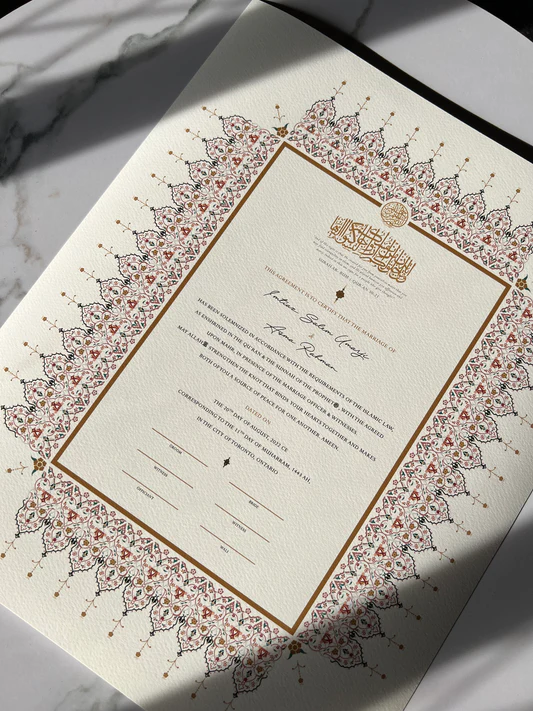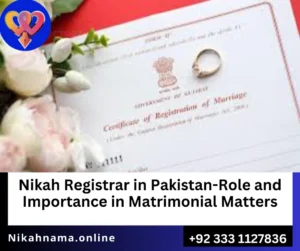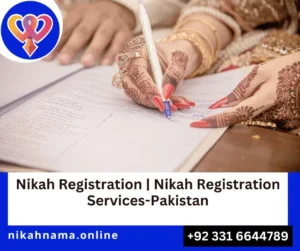Nikah Nama & NADRA Marriage Certificate: Online Nikah Service
NEED ADVICE? GET FREE CONSULTATION !
Nikah Nama & Nadra Marriage Certificate are the Marriage Documents
Nikah Nama/Nikahnama & NADRA Marriage Certificates are marriage documents that outline the terms of a Muslim marriage contract. We provide help to obtain them.
Nikah Nama & NADRA Marriage Certificate Help is the foundation of every legally valid Muslim marriage in Pakistan, and Nikah Nama Online Service exists precisely to make this process simple, lawful, and stress-free. From drafting and registering the Urdu or English Nikah Nama to completing Union Council formalities and securing the NADRA Marriage Certificate, we provide end-to-end assistance under one roof—professionally, discreetly, and in full compliance with Pakistani law.
Need Advice? Get Free Consultation
If you are confused about Nikah Nama clauses, registration requirements, NADRA verification, or delayed marriage records, our legal team is ready to guide you—without cost, without obligation.
NIKAH NAMA SAMPLE
NADRA MARRIAGE CERTIFICATE SAMPLE
Understanding Nikah Documentation Before You Proceed
Nikah documentation in Pakistan is often misunderstood because people assume that a single paper completes the marriage process. In reality, a Muslim marriage becomes legally secure only when both the Nikah Nama and the NADRA Marriage Certificate are completed through the proper statutory channel. Missing or incorrect documentation can later cause serious complications in family disputes, immigration cases, inheritance matters, and court proceedings.
Many couples unknowingly delay Union Council registration to obtain the Marriage Certificate or ignore NADRA verification, assuming that signing the Nikah Nama alone is sufficient. This assumption frequently leads to problems when proof of marriage is demanded by foreign embassies, banks, courts, or NADRA itself. Proper sequencing and lawful execution of each step is therefore essential, not optional.
At our Nikah Nama Online Service, our role is to ensure that your Nikah is not only Islamically valid but also fully recognized under Pakistani civil law, leaving no documentary gaps that could later be challenged or rejected.
Nikah Nama & NADRA Marriage Certificate Are the Core Marriage Documents
A legally recognized marriage in Pakistan rests on two essential documents:
- Nikah Nama (Nikahnama) – the written Muslim marriage contract
- NADRA Marriage Certificate (MRC) – the government-verified digital record
Without proper registration and NADRA verification, a marriage may face serious issues in immigration matters, visa processing, inheritance claims, family disputes, and court proceedings. Our Nikah Nama Online Service ensures that both documents are prepared, registered, and verified correctly the first time.
Comparison Table:
Nikah Nama vs NADRA Marriage Certificate
| Aspect | Nikah Nama (Nikahnama) | NADRA Marriage Certificate (MRC) |
|---|---|---|
| Legal Nature | Islamic & civil marriage contract | Government-verified civil record |
| Issuing Authority | Licensed Nikah Registrar & Union Council | NADRA through Union Council (CRMS) |
| Legal Basis | Muslim Family Laws Ordinance, 1961 | NADRA Ordinance & CRMS Rules |
| Primary Purpose | Defines rights, obligations & conditions of marriage | Official proof of marriage in national database |
| Mandatory for Marriage | Yes – marriage cannot exist legally without it | Yes – required for legal recognition & verification |
| Signatories | Bride, Groom, Witnesses, Nikah Registrar | Issued after biometric verification |
| Language | Urdu (standard prescribed form) | English & Urdu |
| Used For | Family law matters, dower, Talaq, court disputes | Visa, immigration, passport, inheritance, banking |
| Union Council Role | Registers and seals Nikah Nama | Uploads data to NADRA CRMS |
| Overseas Acceptance | Limited unless attested | Widely accepted internationally |
| Correction Possibility | Through the Union Council / Court | Through the NADRA correction process |
| Our Service Scope | Drafting, registration & legal compliance | CRMS upload, verification & issuance |

What Is a Nikah Nama and Why It Matters
The Nikah Nama is not a ceremonial paper—it is a binding legal contract under Islamic and Pakistani law. It is signed by the bride, groom, witnesses, and the licensed Nikah Registrar, then registered with the Union Council.
A properly drafted Nikah Nama typically records:
- Free and explicit consent of the bride and groom
- Haq Mehr (dower) amount and payment terms
- Rights and obligations of husband and wife
- Conditions relating to Talaq, Talaq-e-Tafweez, and dissolution
- Any additional lawful conditions agreed by the parties
This document plays a crucial role in protecting marital rights, especially the rights of women, by ensuring transparency, consent, and enforceable conditions.
Islamic Concept of Marriage: A Contract, not a Sacrament
Under Islamic jurisprudence, marriage is fundamentally a civil contract based on offer and acceptance. Unlike sacramental concepts found in other faiths, Muslim marriage is contractual in nature and may be dissolved lawfully for valid reasons.
Pakistani courts have consistently recognized this principle, most notably in Khurshid Bibi v Muhammad Amin, affirming that while marriage has spiritual dimensions, its legal character remains contractual and enforceable like any other civil agreement.
Legal Framework Governing Muslim Marriages in Pakistan
All Muslim marriages in Pakistan must comply with the Muslim Family Laws Ordinance 1961. This law overrides customs or personal practices and makes registration mandatory.
Under the MFLO:
- Every Muslim marriage must be registered
- A prescribed Nikah Nama form must be used
- Marriage registration with the Union Council is compulsory
- Non-registration can lead to legal penalties and evidentiary issues
Our Nikah Nama Online Service ensures strict compliance with MFLO requirements in Karachi, Lahore, Islamabad, and Rawalpindi.
Nikah Procedure in Pakistan – Explained Simply
Nikah is mentioned in the Qur’an and requires no elaborate ritual. Legally and religiously, it consists of a few essential elements:
Offer and Acceptance (Ijab-o-Qabool)
One party makes an offer, and the other accepts it in the same sitting. Either party may initiate the offer.
Free and Full Consent
Consent must be voluntary, informed, and free from coercion. Any marriage obtained through force, fraud, or misrepresentation is voidable.
Witnesses of the Nikah
At least two adult, sane Muslim witnesses are required (two men, or one man and two women).
Our Nikah Nama Online Service coordinates licensed Nikah Registrars and witnesses to ensure every legal and religious requirement is met.
Step-by-Step Procedure of Nikah & NADRA Marriage Registration in Pakistan
| Step No. | Stage | What Happens | Our Role |
|---|---|---|---|
| 1 | Document Verification | CNICs, marital status, age verification of bride, groom & witnesses | Full legal scrutiny before proceeding |
| 2 | Consent & Affidavits | Sworn consent of bride and groom prepared | Drafting & attestation |
| 3 | Appointment of Vakeel (if required) | Authorization for proxy or online Nikah | Legal drafting & verification |
| 4 | Nikah Solemnization | Ijab-o-Qabool in one sitting before witnesses | Licensed Nikah Khawan coordination |
| 5 | Nikah Nama Execution | Nikah Nama signed by all parties | Error-free completion |
| 6 | Union Council Registration | Official registration & sealing | Follow-up & submission |
| 7 | CRMS Upload | Marriage data uploaded to NADRA system | End-to-end handling |
| 8 | Biometric Verification | Bride & groom biometric confirmation | Assisted verification |
| 9 | NADRA Marriage Certificate | Issuance of Marriage Registration Certificate (MRC) | Collection & delivery |
| 10 | Record Finalization | Family tree update in NADRA | Completion confirmation |
Why This Legal Sequencing Matters
Each stage above is interconnected. If a Nikah Nama is improperly filled, unsigned, or incorrectly registered, NADRA may refuse CRMS upload. Similarly, if biometric verification is skipped or mismatched, the Marriage Certificate can be delayed indefinitely. These issues often surface years later—when correction becomes difficult, time-consuming, and costly.
Our service is designed to prevent future disputes, not merely complete paperwork. We ensure lawful compliance at every stage, so your marriage record remains unquestionable before courts, government authorities, and foreign institutions.
A Note on Witnesses and Legal Validity
Under Pakistani law, Nikah witnesses are not required to be independent. Witnesses may lawfully be relatives of the bride or groom, provided they are adult, sane, and Muslim. This clarification is critical because misinformation in this area often causes unnecessary objections or delays during registration.
Our legal team ensures that witness requirements are met correctly and lawfully, without imposing conditions that have no basis in Pakistani family law.
How Our Nikah Nama Service Protects You
Nikah Nama Online Service is not a form-filling service. We operate as a legal facilitation platform, ensuring that your Nikah documentation stands up to scrutiny—whether before NADRA, Union Council, courts, or foreign authorities.
From Nikah Nama drafting to NADRA Marriage Certificate issuance, we handle the process professionally, discreetly, and in full compliance with applicable laws.
Online Nikah, Proxy Nikah & Remote Ijab-o-Qabool
Pakistani law recognizes Nikah conducted through representatives (Vakeel) when parties are not physically present. Offer and acceptance may occur via phone or video call, provided:
- Witnesses are physically present together
- Authorized representatives act on behalf of the absent party
- The Nikah is registered at the place of solemnization
These arrangements are particularly useful for overseas Pakistanis, and our team manages the entire proxy documentation process lawfully.
Mandatory Registration of Nikah Nama
For a Nikah to be legally effective in Pakistan:
- The bride must participate in the single sitting (physically or through lawful authorization)
- The Nikah Registrar, witnesses, and representatives must be present together
- The Nikah Nama must be signed and sealed
- Registration must occur with the relevant Union Council.
- Our Nikah Nama Online Service handles registrar coordination, document verification, and Union Council filing without delays.
NADRA Marriage Certificate – Why It Is Essential
The NADRA Marriage Certificate is the official digital confirmation of your marriage in Pakistan’s national database, issued after Union Council registration and biometric verification.
It is required for:
- Visa and immigration applications
- Passport updates and family tree records
- Bank, inheritance, and property matters
- Court and legal proceedings
We assist with NADRA CRMS uploads, data corrections, and verifications through the National Database and Registration Authority, ensuring your marriage record is accurate and complete.
Legal Capacity to Marry Under Pakistani Law
For a marriage to be valid, both parties must have legal capacity:
- Age: 18 years for both bride and groom under current law (overriding older interpretations of the Child Marriage Restraint Act 1929)
- Gender: One male and one female
- Mental Capacity: Sound mind
- Religion: A Muslim woman cannot marry a non-Muslim man under Muslim law
Nikah Registrars record declarations, but validity issues may still be adjudicated by courts if disputed.
Consent and Protection Against Forced Marriage
Consent must be explicit and unambiguous. Forced marriages are criminal offenses under Pakistani law.
If a woman is married against her will:
- Criminal liability may arise
- Courts may declare the marriage void
- Decrees such as jactitation of marriage may be granted
Our Nikah Nama Online Service emphasizes documented consent, proper counseling, and lawful procedure to protect all parties.
Witnesses and Registrar Compliance
Nikah witnesses do not have to be independent. They can be relatives of the bride or groom, as long as they fulfill the legal and religious requirements (being an adult, of sound mind, and a Muslim). and must sign the Nikah Nama. The Nikah Registrar ensures administrative compliance, while Union Councils supervise registration records.
Although disputes involving witnesses are rare, proper documentation prevents future legal challenges—something our service prioritizes.
Start Your Marriage the Right Way
Nikah Nama & NADRA Marriage Certificate Help is not just paperwork—it is legal security for your future. Nikah Nama Online Service ensures your marriage is valid, verifiable, and protected under Pakistani law.
Need advice? Get a free consultation today and let our experts handle everything—correctly, lawfully, and efficiently.
Recent Posts
Frequently Asked Questions – Nikah Nama & NADRA Marriage Certificate
What does Nikah Nama Service actually cover?
Our Nikah Nama Service covers the complete legal process of drafting, solemnizing, registering, and validating a Muslim marriage in Pakistan. This includes the correct filling of the Nikah Nama, coordination with a licensed Nikah Registrar, Union Council registration, and assistance with NADRA Marriage Certificate issuance so the marriage is legally recognized nationwide. Apart from Karachi, we also provide our services in Lahore, Islamabad, and Rawalpindi through our associate law firms/lawyers, Nikah Khawan, and licensed Nikah Registrars.
Is Nikah Nama alone enough to prove marriage in Pakistan?
No. While Nikah Nama is the foundational marriage contract, it is not sufficient on its own for many legal and administrative purposes. A NADRA Marriage Certificate is required for immigration, visa processing, passport updates, inheritance matters, and court verification. Nikah Nama Service ensures both documents are completed properly.
Why is the NADRA Marriage Certificate required after Nikah?
NADRA Marriage Certificate digitally records the marriage in Pakistan’s national database. Without this record, a marriage may face rejection by embassies, banks, courts, and government departments. Nikah Nama Service handles CRMS upload and verification to avoid future complications.
Can Nikah Nama be registered later if it was missed initially?
Yes, delayed registration is possible, but it often involves additional affidavits, verification, and Union Council scrutiny. Nikah Nama Service specializes in late registrations and rectification cases, ensuring compliance with applicable family laws.
Are witnesses required to be independent strangers?
No. Witnesses do not need to be independent. They may lawfully be relatives of the bride or groom, provided they are adult, sane, and Muslim. Nikah Nama Service follows the correct legal position and avoids unnecessary objections.
Can Nikah be performed online or through a representative?
Yes. Nikah may be performed through authorized representatives (Vakeel) using phone or video call, provided that offer and acceptance occur in one sitting and witnesses are present. Nikah Nama Service manages proxy documentation lawfully, especially for overseas cases.
Is the bride’s consent mandatory for a valid Nikah?
Absolutely. Free and informed consent of the bride is essential. Any Nikah obtained through force, coercion, or fraud may be declared void by a court. Nikah Nama Service documents consent carefully to protect legal validity.
What is recorded in the Nikah Nama regarding Haq Mehr?
The Nikah Nama records the amount, nature (prompt or deferred), and payment terms of Haq Mehr. Incorrect or vague entries can cause disputes later. Nikah Nama Service ensures clarity and enforceability in these clauses.
Can special conditions be added to the Nikah Nama?
Yes. Lawful conditions agreed by both parties—such as Talaq-e-Tafweez or financial arrangements—may be added. Nikah Nama Service helps draft conditions that are legally sound and enforceable.
Who registers the Nikah Nama in Pakistan?
A licensed Nikah Registrar registers the Nikah Nama with the relevant Union Council. Nikah Nama Service coordinates with authorized registrars to ensure proper registration and sealing.
What happens if the Nikah Nama contains errors?
Errors can delay NADRA registration and create legal disputes. Corrections may require Union Council approval or court orders. Nikah Nama Service minimizes errors at the drafting stage and assists with lawful corrections if required.
Is biometric verification compulsory for NADRA Marriage Certificate?
Yes. Biometric verification of both spouses is mandatory for NADRA record finalization. Nikah Nama Service assists with scheduling and resolving biometric mismatches.
Can overseas Pakistanis obtain NADRA Marriage Certificate?
Yes. Overseas Pakistanis can complete registration through authorized procedures. Nikah Nama Service provides structured assistance for overseas cases, including proxy Nikah and documentation alignment.
Does non-registration of Nikah affect legal rights?
Yes. Non-registration can affect inheritance claims, marital status proof, and court proceedings. Nikah Nama Service ensures timely registration to safeguard legal rights.
What is the role of the Union Council in marriage registration?
Union Council registers the Nikah Nama, seals it, and uploads marriage data for NADRA processing. Nikah Nama Service handles follow-ups to prevent delays or rejections.
Can a marriage be declared void despite having a Nikah Nama?
Yes, if consent was absent, fraud occurred, or legal capacity was lacking, courts may declare the marriage void. Nikah Nama Service emphasizes lawful procedure to prevent future challenges.
Is a court appearance required for Nikah registration?
No. Nikah registration is an administrative process, not a court procedure. However, disputes or corrections may require legal intervention. Nikah Nama Service reduces the need for litigation through proper compliance.
How long does it take to obtain NADRA Marriage Certificate?
Timeframes vary based on Union Council processing and biometric verification. Nikah Nama Service streamlines the process to avoid unnecessary delays.
Can a widow or divorcee register Nikah without issues?
Yes, provided marital status is accurately declared and documented. Nikah Nama Service ensures correct disclosure to avoid legal complications.
Is Nikah Nama Service useful for inter-city marriages?
Yes. Where parties belong to different cities, jurisdictional clarity becomes important. Nikah Nama Service manages cross-city coordination lawfully.
What documents are required for Nikah Nama Service?
Typically, CNICs, passport-size photographs, marital status declarations, and witness identification are required. Nikah Nama Service reviews documents before proceeding to avoid rejection.
Can Nikah Nama be used as evidence in court?
Yes. A registered Nikah Nama is a primary legal document in family courts. Nikah Nama Service ensures it is prepared in a court-defensible manner.
Why should Nikah documentation be handled professionally?
Improper documentation can surface as a legal problem years later. Nikah Nama Service focuses on prevention—ensuring the marriage record remains valid, verifiable, and legally secure for life.



